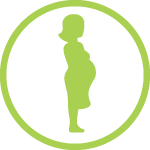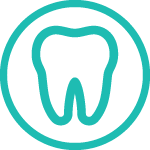Good oral health is an important part of a healthy pregnancy. Good oral health can improve your health during pregnancy. It can also affect the health of your baby.

| Professional oral health visits are part of your pregnancy healthcareChanges in your body during pregnancy can affect your oral health. If it’s been more than 6 months since your last dental check-up, visit your dentist. It’s best if this can happen in the first 3 months of your pregnancy. If you’re pregnant and can’t afford to see a dentist you may qualify for dental health benefits through the
Alberta Adult Health Benefit.
|

| Dental care is safe during pregnancyWhen you see your dentist you can work together to make a plan for any dental treatments you may need. You can also talk about how to keep your teeth and mouth healthy during your pregnancy. If you see changes in your mouth while you’re pregnant, or have a dental emergency, see your dentist right away. |

| Good oral health habits are important for a healthy pregnancy Keep making good oral care habits part of your daily routine. Prevent tooth decay and gum disease by brushing with fluoride toothpaste twice a day, and flossing once a day. Tender gums, nausea, or a strong gag reflex may make daily oral hygiene harder, but it’s important to keep it up. Limit foods with sugar and starch to mealtimes when possible. Avoid sipping drinks with natural and added sugar between meals. Constant contact with these foods and drinks raises your risk for tooth decay. Avoid using alcohol, tobacco or tobacco-like products. Choosing to quit using these products will help your oral health. |

| Common tooth and gum problems that occur during pregnancy
Pregnancy gingivitis is a gum disease during pregnancy that makes your gums more sensitive because of hormone changes. Your gums may be red, swollen, bleed easily, and tender to touch. Tobacco products and alcohol raises your risk for gingivitis. Early treatment of gingivitis prevents a more serious condition called periodontal disease.
Tooth decay happens when bacteria in your mouth use sugar to make acids that eat away at your teeth. The number of times your teeth are exposed to acid raises your risk for getting tooth decay. Pregnancy doesn’t cause tooth decay. Choosing foods and drinks with sugar more often will raise your risk for tooth decay. Limit foods and drinks with added sugar.
Tooth erosion is a type of wear on your teeth that is permanent. It can be caused by stomach acids that contact your teeth if you vomit, have heartburn, or reflux during your pregnancy. Rinse your mouth with water and wait to brush your teeth for 30 minutes. Erosion makes teeth sensitive and uncomfortable. It raises your risk for getting tooth decay. Talk to your dentist about the benefits of using fluoride to strengthen your teeth. |
